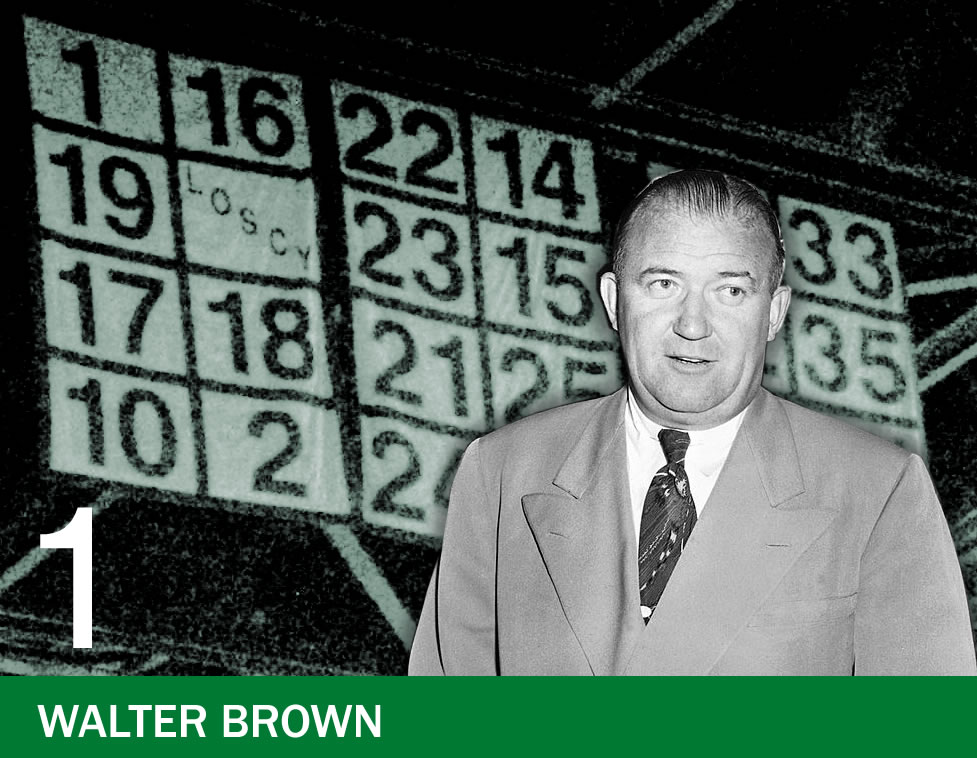From now until February 11, Red’s Army will be posting stories about the players behind the Celtics’ 22 retired numbers and that one retired nickname. Stories will be posted in the order that the numbers were retired.
So you think you’re a pretty big Cetics fan? I can assure you, you’re nowhere near as big a fan of the Celtics as Walter Brown was.
The story begins back in 1926 when Tex Rickard, who had built the third Madison Square Garden in Manhattan, decided that what the United States needed was not so much a really good five cent cigar as six more Madison Square Gardens.
The second of seven total Madison Square Gardens was going to be built above Boston & Maine’s North Station. Thanks to the collapse of the stock market and the death of Tex in ’29, it was also the last of these replica Gardens.
The Boston & Maine railroad owned the Boston Garden up to the mid 30s, when it was sold to the Boston Arena Corporation who, as the name suggests, also owned the old Boston Arena (now Matthews Arena). The manager they brought on to oversee the Garden? George V. Brown. Three years after he took the job, George Brown died unexpectedly just four days shy of his 57th birthday.
The Boston Garden-Arena Corporation hired George’s son Walter A. Brown to take over George’s two jobs: Managing the facility as a whole and the Boston Bruins in particular. The Bruins then–as today–were owned by the same people who owned the arena.
At the end of World War II, Brown decided that the arena needed a basketball team.
So he mortgaged his house to start one.
Yep.
The guy put up his house as collateral to start the Boston Celtics.
Brown was part of a group of hockey arena owners and operators that combined to form the Basketball Association of America in 1946. He was also instrumental in arranging a merger with the National Basketball League in 1949. The National Basketball League was the older of the two leagues, having started in 1937, but its teams were primarily located in the Midwest, and in smaller towns–it didn’t have the resources to compete against the BAA.
The year after the merger, Brown was at the center of another major change in professional basketball when the Celtics picked Chuck Cooper in the second round of the 1950 draft.
According to a New York Times reporter, another owner said, “Walter, don’t you know he’s a colored boy?” and Brown replied, “I don’t give a damn if he’s striped, plaid, or polka dot! Boston takes Chuck Cooper of Dusquene!” Seven years later, Brown broke the NHL’s color barrier by playing Willie O’Ree.
Chuck’s NBA debut, November 1, 1950, also marked the debut of Bob Cousy and Ed Macauley, and the Celtics coaching debut of one Arnold “Red” Auerbach.
Walter Brown’s Celtics were pretty bad their first few years in the league; they got better when Red Auerbach came along, and became virtually unstoppable with the addition of Bill Russell. Brown got to enjoy some of that success–he saw his team win seven championships in eight years.
And then, over Labor Day weekend in 1964, Brown died of a heart attack. Like his father, he died early; he wasn’t even 60. The Celtics retired number 1 in his honor on October 17, at the first game of the season. They dedicated that season to him and went on to win championship number eight.
The following year the NBA named their original championship trophy after him.
And before I forget, Brown was also responsible for one other longstanding Celtics tradition.
The February road trip.
Whether you were Ed Macauley, Bill Russell, John Havlicek or Larry Bird, you spent most of every February on the road. Why? Because in 1939 Brown and a group of other hockey arena owners started the Ice Capades, and they had dibs on the Garden for two weeks every February. The Celtics still have about a two week road trip each February, but the entertainment that keeps them away from home these days is Disney on Ice.
Brown’s status as one of the Ice Capades owners also helped seal the Ed Macauley/Bill Russell trade. Brown added St. Louis to the Ice Capades schedule to sweeten the deal enough to get Hawks owner Ben Kerner to agree to it.
“a magnificent human being who personified everything good in sports”
Red Auerbach on Walter Brown
The retired numbers project:
Add The Sports Daily to your Google News Feed!
